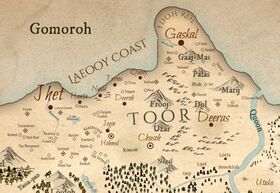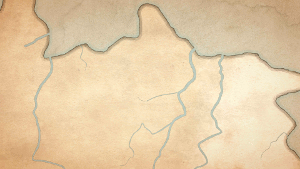Difference between revisions of "Toor"
| Line 34: | Line 34: | ||
=== Ruling dynasties === | === Ruling dynasties === | ||
| − | The civilization of Toor is primarily associated with the Dolysoh dynasty, which is also considered the most powerful dynasty of [[Dantrian calendar|first revolution]] [[Tarnaria]]. Unlike the dynasties of [[State of Asdoh|Asdoh]] and even [[Empire of Barud|Barud]], Dolysohs focused heavily on | + | The civilization of Toor is primarily associated with the Dolysoh dynasty, which is also considered the most powerful dynasty of [[Dantrian calendar|first revolution]] [[Tarnaria]]. Unlike the dynasties of [[State of Asdoh|Asdoh]] and even [[Empire of Barud|Barud]], Dolysohs focused heavily on the religious justification of their rule, which many argue set up the ground for [[Mōroh]]. |
The rule of the Tōrmoh dynasty was set up for a long rule in a relatively stable society, based on the reforms of the Dolysoh dynasty. Gole Tōrmoh's ability to unite regions under his rule based on economic incentives further increased stability and wealth of Toor, but the unexpected death of his son left the court without a clear successor. That problem, however, was made irrelevant by the [[Chaos wars]]. | The rule of the Tōrmoh dynasty was set up for a long rule in a relatively stable society, based on the reforms of the Dolysoh dynasty. Gole Tōrmoh's ability to unite regions under his rule based on economic incentives further increased stability and wealth of Toor, but the unexpected death of his son left the court without a clear successor. That problem, however, was made irrelevant by the [[Chaos wars]]. | ||
Revision as of 21:46, 29 July 2021
| Toor | |
| Political details | |
|---|---|
| Capital | Chusoh |
| Government | Constitutional monarchy |
| Language | Asdoh |
| Religion | Xaewoon |
| Historical details | |
| Established | c. 1770 FR |
| Disestablished | c. 75 SR |
Toor /tʊər/ was an early Tarnarian civilization that existed for three centuries at the end of the first and beginning of the second revolution. It became exceedingly wealthy due to its discovery, development and commercialization of mining.
Etymology
"Toor" means "warrant" or rather "warrant granted through vision" in Jabi, and reflects the justification that many Tarnarian dynasties and clans have traditionally put forth for their rule. Based on the theology of Xaewoon, a toor is a warrant to lead people, because the ruler has special insight about the right path (the Xaewoon).
The Dolysoh dynasty, that had founded and ruled Toor for most of its existence, placed much greater emphasis on the religious justification than the ruling families of Asdoh or Barud in the south.
After the downfall of Toor at the end of the 1st CSR, Gened referred to Mōroh as "the true toor". With the establishment of Stogen in the 2nd CSR, nomadic kingdoms of Tarnaria began to refer to their kingdoms as toors.
History
Toor was established at the end of the 18th century of the first revolution by Sopoh Dolysoh who claimed that him reaching the northernmost point of Tarnaria demonstrates that he has the vision of the path. Over the course of the next century, the Dolysoh dynasty has expanded Toor, eventually subjugating Laeooy Coast and the area which today is known as Commonground, while continuing to fight for its integrity against the Negy, the Oaleed and the Baruds in the south and the tribes from Teamatian in the west.
The rule of Dolysoh was overtaken by the Tōrmoh dynasty in the beginning of the second revolution, and Gole Tōrmoh managed to finally defeat the Negy and displace Oaleed to the south of Mantar hill.
The state of Toor came to an end circa 75 SR when Keetoh and Gened started a serf uprising and established Commonground in 72 SR, which eventually led to the secession of Gaskal and Deeras and the economic and political downfall of Toor's capital Chusoh.
Toor was succeeded by the Five Kingdoms of Mōroh.
Ruling dynasties
The civilization of Toor is primarily associated with the Dolysoh dynasty, which is also considered the most powerful dynasty of first revolution Tarnaria. Unlike the dynasties of Asdoh and even Barud, Dolysohs focused heavily on the religious justification of their rule, which many argue set up the ground for Mōroh.
The rule of the Tōrmoh dynasty was set up for a long rule in a relatively stable society, based on the reforms of the Dolysoh dynasty. Gole Tōrmoh's ability to unite regions under his rule based on economic incentives further increased stability and wealth of Toor, but the unexpected death of his son left the court without a clear successor. That problem, however, was made irrelevant by the Chaos wars.
Dolysoh
Main page: Dolysoh dynasty
- Sopoh Dolysoh, 1771-1779 FR
- Opol Dolysoh, 1779-1811 FR
- Meerō Dolysoh, 1811-1847 FR
- Mosk-Sopoh Dolysoh, 1848-1870 FR
- Beejetoh Dolysoh, 1870-1877 FR
- Mylyn Dolysoh, 1877-1888 FR
- Troh Dolysoh, 1888-1916 FR
- Deeras Dolysoh, 1916-1962 FR
- Modosoh Dolysoh, 1962-1994 FR
Tōrmoh
Main page: Tōrmoh dynasty
- Brone Tōrmoh, 01-55 SR
- Tōrmoh II, 1935-1966 SR
- Brone Tōrmoh, 66-72 SR

